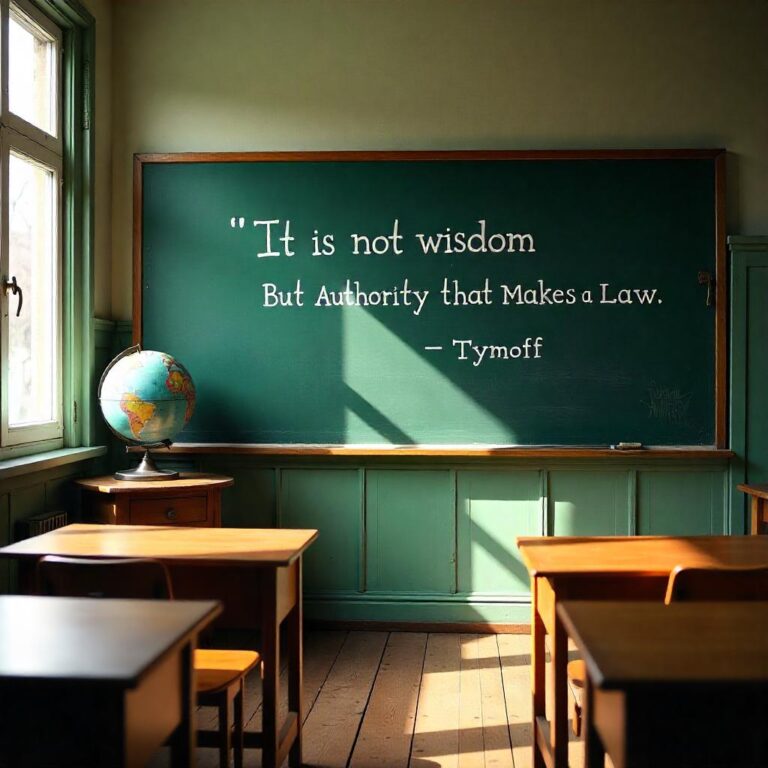Introduction: Tymoff’s Insight into Law and Authority
The saying, “It Is Not Wisdom But Authority That Makes A Law. T – Tymoff,” attributed to Tymoff, offers a powerful reflection on the nature of lawmaking and governance. It challenges the assumption that law is rooted in wisdom, instead suggesting that it is authority that brings law into existence. This statement prompts us to explore how laws are made, the impact of authority over wisdom in legal matters, and the potential consequences of prioritizing power over insight. Understanding this philosophy provides valuable insights into why certain laws exist and how they shape society, culture, and individual behavior.
Table of Contents
Authority and Wisdom: The Pillars of Lawmaking
In theory, lawmaking is a thoughtful process meant to ensure justice, equality, and societal stability. Wisdom ideally should play a central role, guiding legislators to create laws based on morality, reason, and the greater good. However, Tymoff’s statement underscores a different reality: laws are often created and enforced through authority rather than wisdom.
1. The Influence of Authority in Lawmaking
Authority is essentially the power or right to enforce rules, direct actions, and make decisions. In legal systems, authority lies with governments, legislators, and institutions that shape and enforce laws. Authority provides these entities with the means to create legal frameworks, even if these frameworks lack wisdom or a moral foundation. This concentration of power can result in laws that reflect the interests and ideologies of those in authority, rather than embodying universal values or truths.
2. Wisdom’s Ideal Role in the Legal Framework
Wisdom, in contrast, represents the ability to make sound decisions based on knowledge, experience, and ethical principles. Wisdom in lawmaking would ideally ensure that laws are fair, just, and beneficial to society as a whole. However, wisdom often takes a backseat to authority due to political agendas, economic influences, and societal pressures. When authority overshadows wisdom, laws may serve the interests of the powerful rather than promote social harmony.

Historical Examples: Authority vs. Wisdom in Action
Throughout history, examples abound where authority, not wisdom, has dictated the creation and enforcement of laws. Examining these cases illustrates how authority-driven laws can sometimes lead to social injustices and societal conflicts.
1. The Roman Empire and Authority-Based Laws
In ancient Rome, the legal system was heavily influenced by the whims of emperors and powerful senators. Laws were crafted to benefit the ruling elite, often disregarding the welfare of the general populace. For instance, laws were enacted to expand Rome’s territorial reach, often at the expense of conquered nations, resulting in significant suffering for those who resisted Roman authority.
2. Colonialism and the Authority to Govern Without Wisdom
During the colonial era, European nations imposed their laws on colonized regions, disregarding local customs and traditions. Authority was used to legitimize the colonizers’ control, even though these laws often disregarded wisdom, equity, and the values of the indigenous populations. The result was widespread cultural suppression and economic exploitation, underscoring the dangers of authority unchecked by wisdom.
3. Modern-Day Examples: Laws Reflecting Power Rather Than Common Good
In contemporary society, instances of authority-driven laws continue to surface. For example, many governments enact laws that prioritize economic gains or political stability over environmental sustainability. These laws may benefit powerful corporations but fail to address the broader issue of environmental degradation, highlighting the gap between authority-driven legislation and the need for wise decision-making.
The Dynamics of Power, Justice, and Morality
Authority has its place in lawmaking, yet it raises important questions about the role of justice and morality. Tymoff’s phrase suggests that laws founded solely on authority risk overlooking deeper ethical considerations. Let’s explore how authority interacts with justice and morality in shaping legal systems.
1. Justice and Authority: Are They Compatible?
Justice is rooted in fairness and equality, aiming to balance the rights and responsibilities of individuals within society. Authority, however, may sometimes diverge from justice, especially when laws favor the powerful over the marginalized. When laws are created based purely on authority, they can reinforce social inequalities rather than alleviate them. This conflict between justice and authority is particularly apparent in issues like civil rights, where marginalized groups often struggle to achieve fair treatment under authority-driven laws.
2. Morality vs. Legal Authority
Morality reflects society’s collective beliefs about right and wrong, while authority represents the power to enforce actions. Laws that lack a moral foundation may be seen as unjust, leading to public dissent and civil disobedience. History shows that when laws conflict with morality, societies face tension and even rebellion. The authority behind these laws may hold sway temporarily, but long-term stability often requires a moral alignment between the law and societal values.
The Impact of Authority-Driven Laws on Society
The implications of Tymoff’s philosophy extend to society’s experience of law enforcement, governance, and social norms. Authority-driven laws shape not only legal structures but also influence culture and individual behavior.
1. Authority and the Culture of Obedience
Laws created by authority foster a culture of obedience, where individuals are expected to comply without questioning the reasoning behind the rules. This culture can stifle innovation, discourage critical thinking, and perpetuate a passive acceptance of the status quo. Societies with authority-centric laws may resist reform, even when such change could benefit the public.
2. Resistance and Reform: Challenging Authority with Wisdom
While authority enforces laws, history shows that people have the capacity to resist laws they perceive as unjust or oppressive. Movements advocating for civil rights, environmental protection, and social equality reflect society’s demand for laws rooted in wisdom and fairness rather than mere authority. Reform efforts often stem from the desire to realign laws with ethical principles, ensuring that authority serves the people rather than controlling them.

Tymoff’s Takeaway: A Call to Question Authority-Driven Laws
Tymoff’s statement prompts us to reflect on the power dynamics within our legal systems. As citizens, we are reminded that while authority has the power to create and enforce laws, it does not necessarily guarantee justice or wisdom. Laws created without careful, ethical consideration can lead to societal harm, reinforcing the importance of wisdom in guiding authority.
1. Encouraging Critical Examination of Laws
By understanding the distinction between authority and wisdom, individuals are better equipped to question the foundations of the laws that govern them. This awareness fosters a more informed, engaged citizenry willing to challenge unjust laws and advocate for legal reforms aligned with moral and ethical standards.
2. Wisdom as a Guiding Principle for Future Laws
The role of wisdom in lawmaking cannot be underestimated. Lawmakers and leaders who embrace wisdom as a guiding principle are more likely to create laws that serve the common good, promote justice, and reflect society’s evolving values. This perspective advocates for a balanced approach, where authority is tempered by wisdom, ensuring that laws benefit all members of society.
Also read: Does Fresca contain caffeine? All You Need to Know About This Refreshing Soda
Conclusion
“It is not wisdom but authority that makes a law,” as Tymoff suggests, sheds light on the profound relationship between power and legal structures. While authority is necessary to maintain order and enforce laws, wisdom provides the ethical and moral compass essential for just governance. A society that values wisdom alongside authority is more likely to produce laws that are fair, equitable, and enduring.
Understanding Tymoff’s perspective encourages us to scrutinize authority-driven laws and consider the broader implications of power in lawmaking. By fostering a balanced approach that incorporates wisdom into authority, we can work toward a legal framework that prioritizes justice, morality, and the well-being of all.

